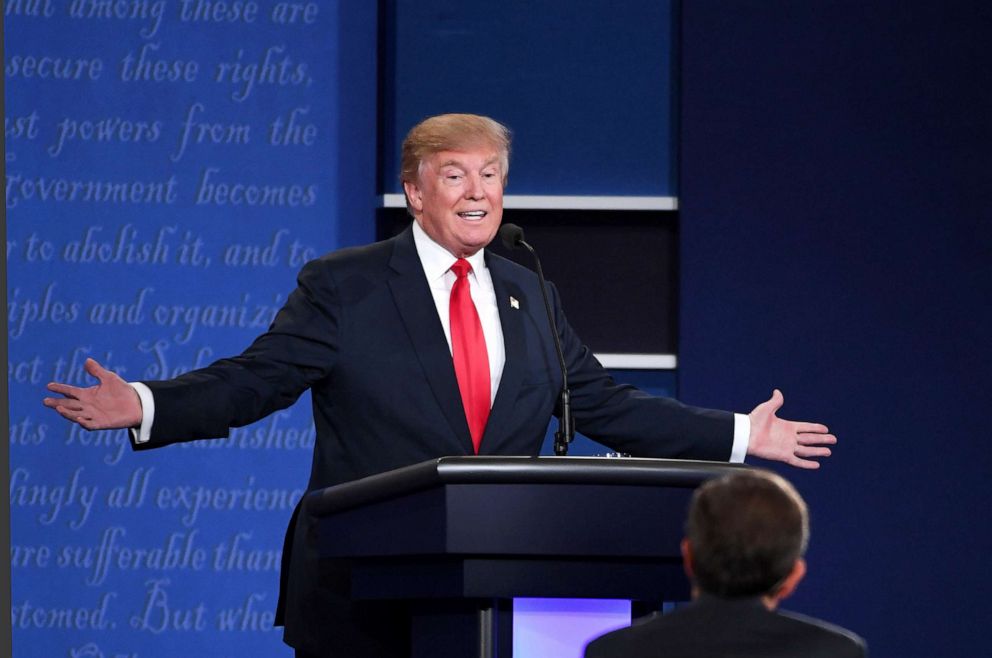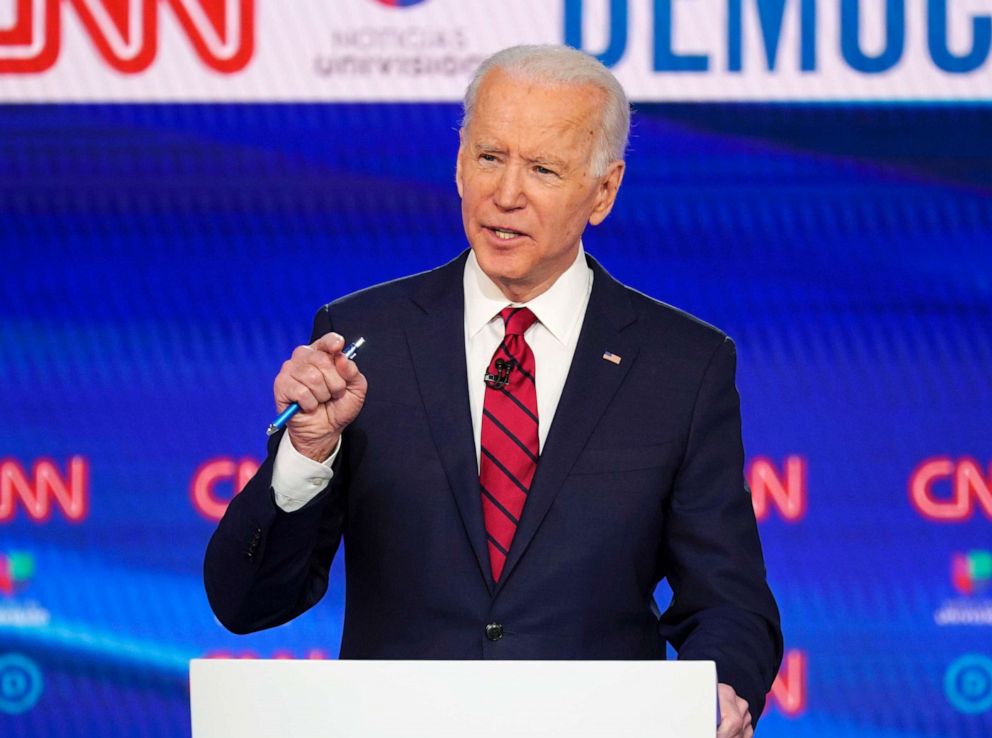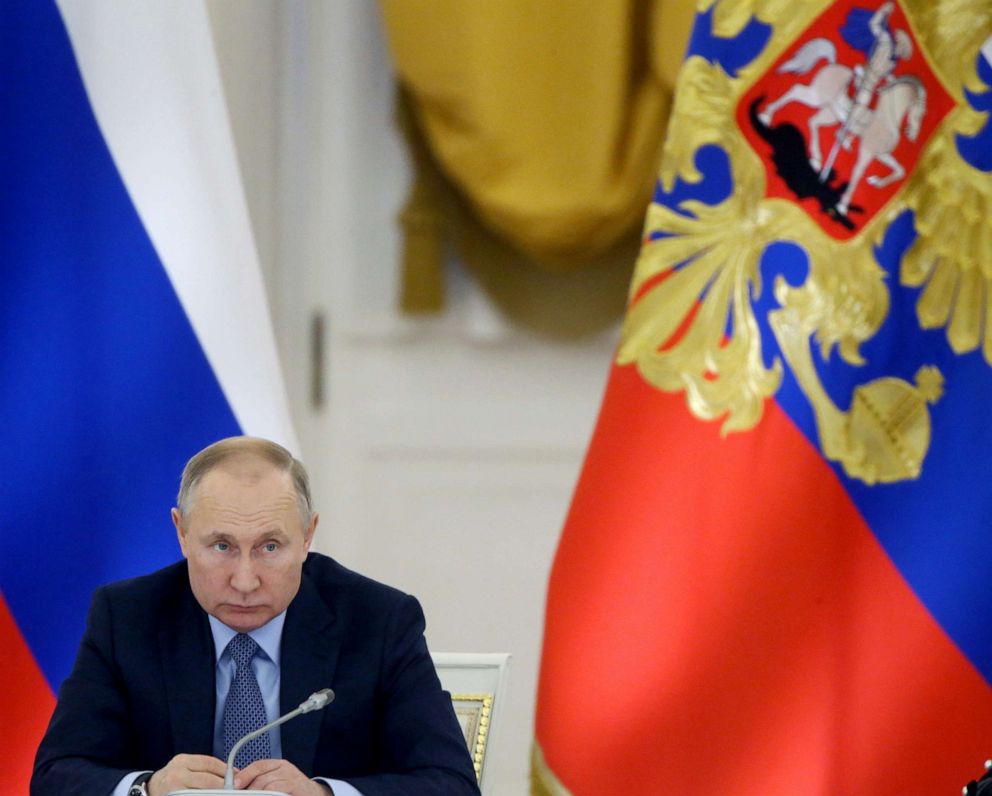俄罗斯正在进行的干涉总统选举的厚颜无耻的努力选举正如他们四年前所做的那样国家安全官员以及包括中国在内的其他对手。但与2016年不同的是邮件投票的迅速普及随着数百万人准备以另一种方式投票,应对冠状病毒大流行给选举安全带来了新的不确定性。
特朗普总统对猖獗的欺诈行为的未经证实的指控加剧了对邮件投票的焦虑,这种投票正在几个州进行,尽管有几十名州选举官员告诉美国广播公司新闻他们对系统有信心。在整个周期中,他反对通过邮件投票的运动超过了他在2016年所做的类似努力,当时他在没有证据的情况下辩称,选民欺诈是唯一的原因希拉里·克林顿赢得了普选。他自己的选举诚信委员会没有发现这方面的证据。
特朗普和前副总统今年竞选的完整性乔·拜登在竞争日益激烈的政治环境中发挥了巨大作用,因为国内外都有人试图破坏对民主进程的信心。
拜登试图通过指出特朗普本人在佛罗里达州从白宫通过邮件投票来对抗特朗普的攻击。
一些选举专家认为,特朗普反对邮寄投票的攻势是一种压制选民的工具,这可能为“如果他输了,争夺一场势均力敌的选举”奠定基础书写里克·哈森是加州大学欧文分校的法律和政治学教授,也是《选举崩溃:肮脏的把戏、不信任和对美国民主的威胁》一书的作者
“特朗普过分关注邮寄投票的最良性解释是,他正在为11月可能输给民主党对手乔·拜登(Joe Biden)寻找借口。不太善意的解释是,他试图制造混乱,降低投票率,破坏选举的合法性,”哈森写道。
周二,在俄亥俄州克利夫兰凯斯西储大学(Case Western Reserve University)举行的第一场总统辩论中,两位竞争对手将围绕选举的完整性展开激烈辩论,这是总统辩论委员会(Commission on Presidential辩论会)预演的话题之一。
俄罗斯问题
甚至在今年的选举之前,在特朗普担任总统期间,关于2016年竞选完整性的问题就一直困扰着他,此前情报官员披露,俄罗斯总统弗拉基米尔·普京(Vladimir Putin)亲自指挥了一场广泛的影响力竞选,以帮助特朗普。

2016年11月9日,唐纳德·特朗普在内华达州拉斯维加斯大学参加第三场也是最后一场总统辩论。
参议院一个两党小组今年肯定了情报界的说法,拒绝了情报界在做法上对特朗普有偏见的说法。
影响力竞选的披露和对他的团队是否与俄罗斯勾结的调查,正如特朗普所说,在他第一个任期的最初几年,给他蒙上了一层“云”。
即使在被任命调查俄罗斯干涉的特别顾问罗伯特·穆勒调查后,发现它不能证实共谋或阴谋指控,这个问题仍然是总统的痛点。以数百万票的优势输掉普选,以微弱优势赢得一些州,这使得特朗普在批评者面前处于守势,批评者继续声称他的胜利可能是不应该的。
特朗普一再驳斥俄罗斯在让他入主白宫方面发挥作用的说法,并将他的团队与俄罗斯特工的参与视为“骗局”,同时指责包括拜登在内的奥巴马政府在转换时睡着了。
当被问及特朗普怀疑俄罗斯在2016年的干涉时,拜登在2014年表示哥伦比亚广播公司的采访在2019年10月,“他是一个白痴——从这个角度来说。这个大家都知道。大家都知道。没人怀疑。”
在2018年中期选举之前,国家安全官员再次警告称,俄罗斯再次陷入困境。中期选举后,情报界报告称,尽管投票没有妥协,但影响运动,包括来自俄罗斯和伊朗的影响运动,仍在持续。审查源于2018年9月的一项行政命令,该命令规定定期进行选举评估。
11月各州转投邮寄投票
今年,选举安全已经成为2020年总统竞选的核心,部分原因是特朗普自己造成的——他无情地抨击了邮寄投票的使用,提出了普遍欺诈的毫无根据的建议。
“我们输掉这场选举的唯一途径是选举是否被操纵,”他在8月份访问威斯康星州时说。特朗普在2016年竞选前也发表了同样的言论。
在今年秋天之前的几个月里,特朗普一直试图在投票实践中播下不信任的种子,包括毫无根据地暗示外国行为者可以利用这一点,就像该国最依赖它一样。
在11月份之前,至少有32个州,加上华盛顿特区,已经调整了他们的选举蓝图,以扩大选民的选择,并由于新冠肺炎的原因使投票更加容易。
特朗普上周加大了对普遍欺诈的警告,甚至拒绝承诺如果他在选举中失败,将进行和平的权力交接,并坚持认为邮寄选票将是问题所在。“扔掉选票,你会过得很平静——不会有转移,”他说。
“我们在哪个国家?”拜登说,当记者要求他回应时。“我不知道该怎么说,但这并不令我惊讶。”
在随后对MSNBC的采访中,拜登说美国人民将会被倾听。
“这个国家的每一次投票都会被听到,而且不会被阻止,”他说。“我相信所有对投票的不负责任、令人愤慨的攻击——我们将在这个国家举行一次我们一直以来都有的选举。他会离开的。”
总统的努力是在他自己的竞选团队和州共和党鼓励支持者通过广告、在线帖子和电话留言使用邮寄投票的时候做出的,也是在他自己的情报官员驳斥他的说法的时候做出的。
美国联邦调查局(FBI)局长克里斯托弗·雷(Christopher Wray)周四在国会面前表示:“从历史上看,我们没有在重大选举中看到任何形式的协调一致的全国选民欺诈行为,无论是通过邮件还是其他方式。”
拜登明确支持在全国范围内扩大邮件投票以应对疫情,甚至呼吁国会为援助各州的努力提供更多资金,同时将特朗普的战略称为“非美国式的”。
他的竞选团队也在扩大其法律运作,预计今年秋天将在投票问题上发生重大争斗,两名前美国总律师和其他高级律师将监督可能演变为11月结果的激烈斗争。

2020年3月15日,前副总统乔·拜登在华盛顿参加民主党总统初选辩论。
特朗普政府对该国最著名的机构之一美国邮政服务的攻击,进一步加剧了人们对选举中邮寄投票完整性的担忧。
在特朗普就任邮政局长路易·德霍伊(Louis DeJoy)期间,美国邮政总局实施了有争议的削减成本措施,一些批评者认为,这些措施可能会通过减缓邮件传递对选举产生不利影响。本月早些时候,联邦法官停止了这些改变。
众议院民主党人在8月份通过了一项法案,该法案将向USPS追加拨款250亿美元,这是该机构理事会(其参议院确认的成员都是由特朗普任命的)早在4月初就要求国会提供的现金注入,因为预计会有损失。
特朗普试图以此为证据,证明美国邮政将无法处理增加的邮寄投票,声称“他们没有钱进行普遍的邮寄投票”。因此,他们不能这么做,”特朗普在8月12日表示。但德约伊拒绝了特朗普,周五表示,“我们有能力做到这一点,我们将交付选票。”
特朗普声称外国政府干涉邮寄投票
总统还提出了外国政府试图利用邮寄投票的增加来干涉总统选举的可能性,这是在司法部长比尔·巴尔(Bill Barr)在6月份接受福克斯新闻(Fox News)采访时提出的一个未经证实的说法,当时他暗示外国可以这样做,美国选举官员很难察觉到。
“我们面临的最大风险是邮寄选票,因为有了邮寄选票,对一个外国势力来说,无论是俄罗斯、中国、伊朗还是朝鲜,都要容易得多...特朗普在8月初表示:“对他们来说,伪造选票并把它们寄出去要容易得多。"对他们来说,用普遍邮寄选票作弊要容易得多。"
然而,选举官员和联邦调查局质疑这种情况引用安全措施和特定的地方-像选票被印在特殊的纸上或有独特的条形码-使这极不可能发生,更不用说发生未被发现。
俄罗斯再次影响和干涉的幽灵
俄罗斯试图干涉的范围超出了邮件投票。九月初,美国广播公司新闻据报告的根据内部电子邮件和美国广播公司新闻获得的文件草稿,国土安全部在7月初拒绝发布情报公告,警告执法机构俄罗斯计划攻击拜登的精神健康。
该公告详细介绍了俄罗斯反对拜登精神健康的运动,再次呼应了特朗普自己的言论,并指出莫斯科意图影响11月选举的迄今为止最具体的例子。
没有证据表明拜登在精神上不适合当总统,他和他的竞选团队都反对特朗普的这种说法。

2019年12月26日,俄罗斯总统弗拉基米尔·普京在莫斯科克里姆林宫举行的国务院会议上讲话。
去年6月,特朗普甚至在接受美国广播公司(ABC News)独家采访时表示,如果外国政府诽谤政治对手,他将“倾听”。
特朗普告诉美国广播公司首席新闻主播乔治·斯特凡诺普洛斯:“我想你可能想听,听没有什么错。”“如果有人从挪威打来电话,(并说)‘我们有关于你对手的信息’——哦,我想我会想听的。”
其他外国势力担心
但是俄罗斯并不是唯一试图左右美国投票的外国。早在8月份,美国情报界发表的一份公开声明透露,美国的三大对手正积极试图干预总统竞选,包括俄罗斯为推动特朗普连任所做的努力。
情报官员还得出结论,“中国更希望特朗普总统——北京方面认为他不可预测——不会赢得连任。”它发现,伊朗“试图破坏美国的民主机构,特朗普总统,并在2020年选举前分裂国家。”
当被问及这份声明时,特朗普回避了,把问题转回给了记者。
“我们会非常仔细地考虑这个问题,但你是从俄罗斯开始的。为什么不从中国开始呢?我们认为中国可能是一个更大的威胁,”特朗普在新泽西州贝德明斯特的高尔夫俱乐部举行的新闻发布会上说。
特朗普经常淡化显示俄罗斯旨在帮助他在2016年竞选的情报,而拜登痛斥对手的政府因未能采取行动防止外国选举干涉,并表示他正在“通知”克里姆林宫和其他外国政府
拜登在一份长篇声明中写道:“如果当选总统,我将把外国对我们选举的干涉视为敌对行为,这将极大地影响美国和干涉国政府之间的关系。”
在情报界的声明没有明确表示中国正在帮助拜登之后,拜登竞选团队的外交政策顾问托尼·布林肯(Tony Blinken)表示,这位前副总统“多年来一直领导着反对外国干涉的斗争,并拒绝接受任何旨在帮助他竞选的外国材料——这是唐纳德·特朗普他的竞选活动一再失败。"
然而,拜登最后一次在白宫时,奥巴马政府直到2016年10月才公开评论俄罗斯的努力,当时他们指责外国政府黑客攻击包括国土安全部在内的政治机构,干涉选举。前DHS国务卿杰·约翰逊为拖延辩护2017年6月,他说必须考虑保护消息来源和方法,而且“许多人会批评我们可能在选举中偏袒一方。”
但是根据一个两党达成结论2018年6月,参议院情报特别委员会成员指出,奥巴马-拜登政府在打击俄罗斯在2016年竞选期间干预选举方面做得不够。弗吉尼亚州民主党副主席马克·华纳形容官员们“措手不及”
专家表示,拜登和特朗普在选举安全方面的公开分歧,明确了两人在国家安全方法上的“鲜明对比”。
“总统似乎认为外国干涉和选举安全问题是推进他的政治议程的机会,”约翰·科恩说,他是美国广播公司新闻的撰稿人,也是前国土安全部负责情报的副部长,曾在布什和奥巴马政府工作。“乔·拜登倾向于将这些问题视为需要解决的问题,以保护美国的安全……并以此表达他对安全的愿景。”
科恩说,选举安全的重要性在这个周期中可能是独一无二的至关重要,因为“这次选举发生在我们国家异常动荡的时期”——在冠状病毒大流行和种族不平等的动荡之间。
他补充说,特朗普“似乎在煽风点火”。
Trump vs. Biden on the issues: Election security and integrity
Russia's ongoing brazen efforts to interfere in the presidentialelection-- as they did four years ago -- remains a principal concern amongnational securityofficials, along with other adversaries including China. But unlike in 2016, therapid and sweeping embrace of vote-by-mailin response to the coronavirus pandemic injects new uncertainty about election security, as millions prepare to vote in an alternative way.
Fueling those anxieties over mail voting, which is underway in several states, is President Trump’s unsubstantiated allegations of rampant fraud, even as dozens of state election officialstell ABC Newsthat they have confidence in the system. His campaign against vote-by-mail throughout the cycle exceeds similar efforts he made in 2016, when he argued, without evidence, that voter fraud was the only reasonHillary Clintonwon the popular vote. His own voting integrity commission found no evidence of that.
The integrity of this year's matchup between Trump and former Vice PresidentJoe Bidenhas taken on an outsized role in the increasingly competitive political environment, as attempts to undermine confidence in the democratic process mount both from outside the country's borders and from inside the Oval Office.
Biden has attempted to combat Trump’s onslaught by pointing out that Trump himself has voted-by-mail in Florida from the White House.
Some elections experts argue Trump’s offensive against mail-in voting is a voter suppression tool, which could lay the "groundwork for contesting a close election if he loses, "wroteRick Hasen, a professor of law and political science at the University of California, Irvine, and the author of "Election Meltdown: Dirty Tricks, Distrust and the Threat to American Democracy."
"The most benign explanation for Mr. Trump’s obsessive focus on mail-in balloting is that he is looking for an excuse for a possible loss to his Democratic opponent, Joe Biden, in November. The less benign explanation is that he is seeking to sow chaos to drive down turnout and undermine the legitimacy of the election," wrote Hasen.
At the first presidential debate on Tuesday at Case Western Reserve University in Cleveland, Ohio, the two rivals are set to spar over the integrity of the election, one of the topics previewed by the Commission on Presidential Debates.
The Russia question
Even before this year’s election, questions about the integrity of the 2016 race dogged Trump throughout his presidency after intelligence officials disclosed an extensive influence campaign directed by Russian President Vladimir Putin himself to aid Trump.
Donald Trump participates in the third and final presidential debate at the University of Nevada Las Vegas, Nov. 9, 2016.
A bipartisan Senate panel this year affirmed the intelligence community's assertions, rejecting the notion that the intelligence community was biased against Trump in its approach.
The disclosure of the influence campaign and an investigation into whether his team was colluding with Russia cast a "cloud," as Trump described it, over the early years of his first term.
Even after the probe by Robert Mueller, the special counsel appointed to investigate Russian meddling, found that it could not substantiate the collusion or conspiracy allegations, the issue remained a sore point with the president. Losing the popular vote by millions and winning some states by thin margins kept Trump on the defensive with critics, who continued to assert that his victory might have been undeserved.
Trump repeatedly dismissed the suggestion of Russian playing a role in putting him in the White House, and cast his team's involvement with Russian operatives as a "hoax," while blaming the Obama administration, including Biden, for being asleep at the switch.
Asked about Trump doubting Russia’s interference in 2016, Biden said inan interview with CBSin October 2019, "He is an idiot — in terms of saying that. Everybody knows this. Everybody knows it. Nobody doubts it."
Ahead of the 2018 midterms, national security officials again warned that Russia was at it again. In the wake of the midterms, the intelligence community reported that while the vote had not been compromised, influence campaigns, including from Russia and Iran, persisted. The review stemmed from a September 2018 executive order mandating regular election assessments.
States' turn to mail-in voting for November
This year, election security has emerged at the center of the 2020 presidential race in part by Trump's own making -- he has relentlessly assailed the use of the mail-in voting with unfounded suggestions of widespread fraud.
"The only way we're going to lose this election is if the election is rigged," he said during a visit to Wisconsin in August. Trump made the same assertion in the lead-up to the 2016 race.
For months leading into this fall, Trump has sought to sow distrust in the voting practice, including baselessly suggesting that foreign actors could take advantage, just as the country is relying on it most.
Before November, at least 32 states, plus Washington, D.C. have adjusted their election blueprints to expand options for voters and to make voting more accessible due to COVID-19.
Trump ramped up his warnings of widespread fraud last week, even declining to commit to a peaceful transition of power if he were to lose the election, and pushing his belief that mail-in ballots will be the problem. "Get rid of the ballots and you'll have a very peaceful -- there won't be a transfer," he said.
"What country are we in?" Biden said, when a reporter asked him to respond. " I don’t know what to say about it, but it doesn’t surprise me."
In a later interview with MSNBC, Biden said the American people will be heard.
"Every vote in this country is gonna be heard, and they’ll not be stopped," he said. "I am confident all the irresponsible, outrageous attacks on voting -- we’ll have an election in this country that we always have had. And he’ll leave."
The president’s efforts come as his own campaign and state Republican parties encourage supporters to use mail-in voting through ads, online posts, and robocalls -- and as his own intelligence officials refute his narrative.
"We have not seen, historically, any kind of coordinated national voter fraud effort in a major election, whether it's by mail or otherwise," FBI Director Christopher Wray said before Congress Thursday.
Biden, for his part, explicitly backed the nationwide push to expand voting-by-mail in response to the pandemic, even calling on Congress to provide more funding to aid states in their efforts, while casting Trump's strategy as "un-American."
His campaign is also building out its legal operation in anticipation of a major fight over voting this fall, bringing on two former U.S. solicitors general and other top attorneys to oversee what could devolve into a fierce battle over the November's results.
Former Vice President Joe Biden participates in a Democratic presidential primary debate in Washington, March 15, 2020.
Further stoking concerns over the integrity of the election regarding mail-in voting is the Trump administration’s assault on one of the country’s most storied institutions, the United States Postal Service.
The USPS implemented controversial cost-cutting measures under Trump-installed postmaster general Louis DeJoy, which some critics argued could have adverse impacts on the election by slowing mail delivery. Those changes were halted by a federal judge earlier this month.
House Democrats passed a bill in August that would've allocated an additional $25 billion in funding to USPS, a cash injection the agency's board of governors -- whose Senate-confirmed members were all appointed by Trump -- requested from Congress back in early April because of anticipated losses.
Trump has attempted to use this as evidence that USPS won't be able to handle the increased mail-in voting, asserting, "they don't have the money to do the universal mail-in voting. So therefore, they can't do it," Trump said on Aug. 12. But DeJoy rebuffed Trump, saying on Friday, "we’re equipped to do it and we’re going to deliver the ballots."
Trump claims foreign governments interfering with mail-in voting
The president has also raised the possibility of foreign governments trying to interfere in the presidential election by taking advantage of the increase in mail-in voting, an unproven claim that he first made after Attorney General Bill Barr suggested that foreign countries could do this, and that it would be hard for U.S. election officials to detect it, during an interview on Fox News in June.
"The biggest risk that we have is mail-in ballots, because with a mail-in ballot -- well, universal mail-in ballots, it is a much easier thing for a foreign power, whether it's Russia, China, Iran, North Korea...it's much easier for them to forge ballots and send them in," Trump said in early August. "It's much easier for them to cheat with universal mail-in ballots."
However, election officials, and the FBI, havedisputed this scenario, citing the safeguards and specificities in place -- like ballots being printed on special paper or having unique barcodes on them -- that make this highly unlikely to happen, never mind happen undetected.
Specter of Russian influence and interference once again
Russia’s attempts to meddle extend beyond mail voting. In early September, ABC Newsreportedthat the Department of Homeland Security withheld publication of an intelligence bulletin in early July warning law enforcement agencies of a Russian scheme to attack Biden’s mental fitness, according to internal emails and a draft of the document obtained by ABC News.
The bulletin detailing Russia’s campaign against Biden’s mental health again echoes Trump’s own rhetoric -- and indicates the most specific example to date of Moscow’s intentions to influence November’s election.
There is no evidence to suggest that Biden's not mentally fit to be president, and both he and his campaign have pushed against this narrative from Trump.
Russian President Vladimir Putin speaks during the State Council's meeting at Grand Kremlin Palace in Moscow, Dec. 26, 2019.
In June of last year, Trump even said in an exclusive interview with ABC News he would "listen" if foreign governments offered dirt on political opponents.
"I think you might want to listen, there isn't anything wrong with listening," Trump told ABC News Chief Anchor George Stephanopoulos. "If somebody called from a country, Norway, [and said] ‘we have information on your opponent' -- oh, I think I'd want to hear it."
Other foreign powers a worry
But Russia isn’t the only foreign country seeking to sway America’s vote. Back in August, a public statement issued by the U.S. intelligence community revealed that three of the nation’s top adversaries are actively attempting to meddle in the presidential race, including efforts by Russia to advance Trump's reelection efforts.
Intelligence officials also concluded that "China prefers that President Trump – whom Beijing sees as unpredictable – does not win reelection." Iran, it found, "seeks to undermine U.S. democratic institutions, President Trump, and to divide the country in advance of the 2020 elections."
Asked about the statement, Trump deflected, turning the question back on the reporter.
"We're gonna look at that very closely, but you started off with Russia. Why don't you start off with China? We think China's maybe a bigger threat," Trump said during a press conference at his golf club in Bedminster, New Jersey.
Trump has frequently downplayed intelligence showing Russia’s aim to aid his campaign in 2016, while Bidenexcoriated his rival’s administrationfor failing to take action to prevent foreign election interference, and said that he is putting the Kremlin and other foreign governments "on notice."
"If elected president, I will treat foreign interference in our election as an adversarial act that significantly affects the relationship between the United States and the interfering nation's government," Biden wrote as part of a lengthy statement.
In the wake of the intelligence community’s statement, which did not explicitly say that China is aiding Biden, Tony Blinken, a foreign policy advisor with the Biden campaign, said that the former vice president "has led the fight against foreign interference for years, and has refused to accept any foreign materials intended to help him in this election - something thatDonald Trumpand his campaign have repeatedly failed to do."
However, the last time Biden was in the White House, the Obama administration did not publicly comment on Russia’s efforts until October of 2016, when theyaccused the foreign governmentof hacking political institutions, including the Department of Homeland Security, and interfering in the election. Former DHS Secretary Jeh Johnsondefended that delayin June 2017, saying that there has to be consideration given to protecting sources and methods, and also, that “many would criticize us for perhaps taking sides in the election.”
But according to abipartisan conclusion reachedby members of the Senate Select Committee on Intelligence in June 2018, the Obama-Biden administration did not do enough to combat Russia’s election meddling during the 2016 campaign. Vice Chairman Mark Warner, D-Va., described officials as being “caught flat-footed.”
The overt differences between Biden and Trump on election security, experts say, crystallize the "stark illustration" between the two men in their approaches to national security.
"The president seems to see foreign interference and election security issues as an opportunity to advance his political agenda," said John Cohen, an ABC News contributor and former Department of Homeland Security undersecretary for intelligence who worked in both the Bush and Obama administrations. "Joe Biden tends to view them as issues that need to be solved to protect the security and safety of America…as a way to articulate his vision on security."
The significance of election security is perhaps uniquely paramount this cycle, Cohen said, because "this election is happening in an extraordinarily volatile time in our country" -- between the coronavirus pandemic and the unrest over racial inequality.
And Trump "seems to be fanning the flames," he added.






